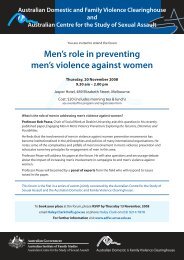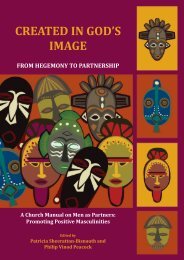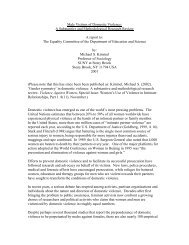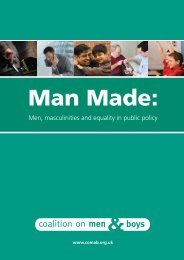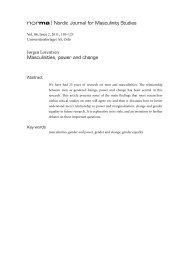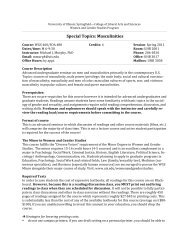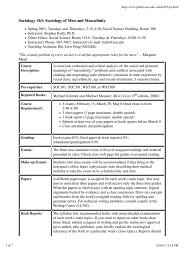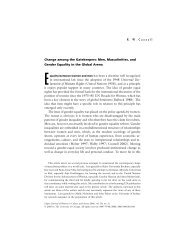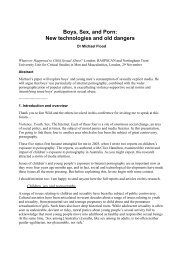Why Men Should Support Gender Equity Michael S ... - XY online
Why Men Should Support Gender Equity Michael S ... - XY online
Why Men Should Support Gender Equity Michael S ... - XY online
You also want an ePaper? Increase the reach of your titles
YUMPU automatically turns print PDFs into web optimized ePapers that Google loves.
negatively, and rated as not seriously committed to their jobs.<br />
So what did the men do? They disguised parental leave as something<br />
else—unused vacation time, comp time, sick leave. They went to<br />
their senior partner or manager and said, “My wife is going to have a<br />
baby next month. I am going to take my three weeks vacation then,<br />
and while on vacation I will get sick, so I will then have to take my<br />
three weeks of sick leave.” Their colleagues and supervisors winked<br />
and said “no problem, good luck.” In essence, these men took what I<br />
have no come to call “informal parental leave” because they were so<br />
eager to do so, but they also had to preserve their masculinity by<br />
appearing to be more concerned about their career.<br />
We need these men to demand parental leave, we need policies that<br />
encourage and support it, and we need to change the culture of our<br />
organizations to support men taking parental leave—because ONLY<br />
when men share housework and child care can we have the kinds of<br />
lives we say we want to have, and ONLY when men share house<br />
work and childcare will women be able to balance work and family,<br />
be able to have it all. This, it seems to me, is the promise of gender<br />
mainstreaming.<br />
Were our venue slightly different, I would take up the last arena of<br />
change for women, sexuality, but I think for today, I’m going to make<br />
one quick remark and conclude. It’s about rape and sexual assault.<br />
Nearly 20 years ago, anthropologist Peggy Reeves Sanday proposed a<br />
continuum of propensity to commit rape upon which all societies<br />
could be plotted—from rape-prone to rape free. (For the curious, by<br />
the way, the United States was ranked as a highly rape prone society,<br />
far more than any country in Europe; Norway and Sweden were<br />
among the most rape free.) Sanday found that the single best<br />
predictors of rape-proneness were (1) whether the woman continued<br />
to own property in her own name after marriage, a measure of women’s<br />
autonomy; and (2) father’s involvement in child-rearing, a measure<br />
of how valued parenting is, and how valued women’s work is.<br />
Clearly here is an arena in which women’s economic autonomy is a<br />
good predictor of their safety—as is men’s participation in childrearing.<br />
Those societies in which women are able to have their “private<br />
careers” and in which men express “public fatherhood” are the safest<br />
Women’s Studies Review, Fall 2005 113



